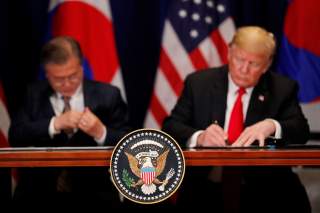North Korea and America’s Second Summit: Here’s What Doug Bandow Thinks Will Happen
"What happens next is almost entirely up to the president."
Editor’s Note: Want more ideas on what will happen at the summit? Check out all 76 expert opinions we gathered here.
Round one of the Trump-Kim show came as a surprise. After threatening to unleash “fire and fury” on the Democratic People’s Republic of Korea, President Donald Trump held a love fest with North Korean leader Kim Jong-un in Singapore. Although the fruit of the meeting remains sparse, the president insists that the North ultimately will denuclearize.
So far the most important impact of the highly publicized meet-up has been burgeoning North-South contacts. While they will not directly yield denuclearization, they contribute to the general warming of relations which Pyongyang insists is necessary for disarmament to occur.
What happens next is almost entirely up to the president. His apparent belief that Kim would swiftly empty the North Korean arsenal was never realistic. The North’s nuclear weapons have been acquired only at a great price and buttress the Kim family’s political legitimacy. They also are the only reason other countries pay much attention to an otherwise impoverished, unimportant, isolated state. Unsurprisingly, U.S. intelligence doubts his willingness to disarm.
Even if Kim has made a “strategic decision” to give up his nuclear weapons, as South Korean diplomats with whom I speak insist, he will not do so for free. Nor will he sacrifice his leverage without receiving more than verbal assurances in return. Consider the fate of Libya’s Muammar Gaddafi. Hence the North Korean formula which was enshrined in last June’s summit statement: better relations and atmosphere before denuclearization.
The U.S. administration reportedly is crafting an economic package to present to the DPRK. But more fundamental for Kim is regime security. He will not compromise on his future. Any serious progress requires addressing this issue.
If not, another stalemate impends. That could push Washington toward renewed confrontation with North Korea, resulting in increased tensions with China and Russia, which have essentially abandoned “maximum pressure.” The administration also could find itself on a collision course with Seoul, which already worries that the president has failed to adequately respond to the North’s overture.
Indeed, just as the Europeans have broken with America over reimposing sanctions on Iran, Washington might find itself largely alone, perhaps backed only by Japan, in again seeking to isolate Pyongyang. That would give Kim a significant victory and position him for talks with Trump’s successor.
Doug Bandow is a Senior Fellow at the Cato Institute. A former Special Assistant to President Ronald Reagan, he is the author of Tripwire: Korea and U.S. Foreign Policy in a Changed World and co-author of The Korean Conundrum: America’s Troubled Relations with North and South Korea.
Image: Reuters.


